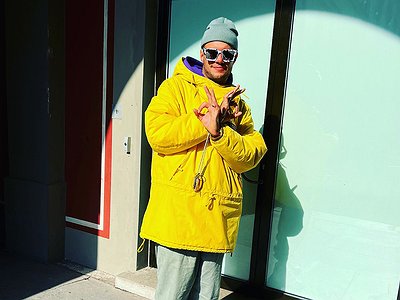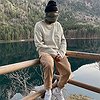Part 2
Take us through a day in your life, from a possible morning routine through to your work, please. Do you have a fixed schedule? How do music and other aspects of your life feed back into each other - do you separate them or instead try to make them blend seamlessly?
Normally I wake up round eight or nine then I'll check emails and see if there's something that needs to be taken care of right in that moment - mostly I do that while l’m still lying in bed. After that I get up and tick off all the to dos on the list.
In the morning, I mostly do office stuff like mails, planning releases and everything that needs to be done label wise. After lunch I do all the creative work like music, graphics, videos whatever I got to do. Every day it differs a little but often it's just like that.
Sometimes I am out for breakfast or lunch in town that's a good way to spend a little time outside when you work from home because when I am home I am just always working and with my phone I can do a lot of stuff on the go. Then I get back and work till round about six or eight depending on the season … in the winter I tend to work longer. In the summer I go for a bike ride then while listening to some podcasts before I get home and hop in my Jacuzzi (aka my bath tube) to chill for two hours, have a beer, watch studio videos or mini documentaries of artists I like. Everything that comes up on my socials over the day. I really love it, it's probably my favourite time of the day besides studio time. That’s when I can relax. When I drop the bathing bomb in the tub (I recommend Lush for the right equipment here) I know the day is over.
Actually, it's never really over because my brain never shuts down ahead of sleep but I calm down. When you are your own boss, your mind is always working from the moment when you open your eyes till you fall asleep. One of the hardest things to learn for me still is a healthy work / life balance. I came from a place where I just worked twelve hours a day, nearly seven days a week … relentlessly. It was important to get where I am today but it wasn't healthy … that's why I'll try to find back to a more balanced lifestyle right now.
It's a pretty hard unlearning process to tell my mind that I do not have to hustle 24/7. But I'm slowly getting better in slowing down and enjoying the flowers.
Can you talk about a breakthrough work, event or performance in your career? Why does it feel special to you? When, why and how did you start working on it, what were some of the motivations and ideas behind it?
I never really broke through in terms of my career. There have been a lot of highlights over the years like playing all around Europe and getting recognition from some of my favourite artists in the game but I think one of the most important aspects of my career so far has been starting my own label NBAST (NUTHIN BUT A SOUL THING).
As I told you earlier I never made music for the industry and so I often I got turned by certain labels because my tracks didn't fit into their box. With my own label, I created a space for myself, independency and the artistic freedom I needed for my music to develop. People told me that I am crazy when I told them I will start pressing up some records, they told me nobody would buy my music … today I can proudly say I released fourteen records, sold nearly ten thousand units and made myself a name with the label publishing all my music on there but also the work of other artists from around the globe from Ecuador to Paris, over Perth, London, Berlin and Heidelberg. I also started another label called “WE MUST PROTECT THIS HOUSE” for more dance floor driven cuts last year.
After a very successful first release with the likes of Pete Tong, Cinthie, Huxley and many more we're about to drop our second record in February. NBASTWAX013 gonna hit the shelves Jan 12.
There are many descriptions of the ideal state of mind for being creative. What is it like for you? What supports this ideal state of mind and what are distractions? Are there strategies to enter into this state more easily?
I'm what you would call a self-starter. I don't really have any problems to find energy or inspiration to come in and make music. When I make music, everything gets clear and all of life's drama dissolves. I'm fully present in the very moment and I just love that state of mind that’s why it's easy to enter it because it makes me happy and makes me feel good.
I try to make as much music as I can but it isn't that easy when you have to take care of everything else, too. There are a thousand distractions out there but I think the worst is social media especially nowadays when you have to turn every piece into content.
If I could I would delete all my socials and spend more time in the studio.
Music and sounds can heal, but they can also hurt. Do you personally have experiences with either or both of these? Where do you personally see the biggest need and potential for music as a tool for healing?
I think music cannot hurt you. For me music has always been unconditional love and just like love it's not love itself that hurts you, it's when you lose someone, when you're lonely after a break up or get rejected by someone you love but these are all results of an external force. Music only exhilarates certain feelings like happiness or sadness. Music has a healing power; it can feel like a warm hug from your loved ones.
We're all vulnerable and broken and beautiful music can help to heal our hearts and is able to put the broken fragments of our soul back together. Like emotions it's energy that you can't see or touch but feel, energy that has been stored on a medium. I think that every good piece of music starts out of an emotion.
I see music as therapy. Since I was a child it has been my best friend and has had a therapeutic impact on my life.
There is a fine line between cultural exchange and appropriation. What are your thoughts on the limits of copying, using cultural signs and symbols and the cultural/social/gender specificity of art?
I feel like if you like something and understand it and it helps you to express yourself then you can use it, but you have to use it with respect. You can't just take the credits of something and put your name underneath it - that's not how things work. Unfortunately, a lot of people forget that nowadays.
Just look at the techno scene. Back in the days techno was represented by mostly black artists. techno music was a sign of resistance against the system. People that mostly had been excluded from society came together for a couple of hours leaving all their day-by-day problems at the door to come along to dance and sing the songs. Nowadays it's used as a gimmick from promoters to deejays and millennials.
It's funny how many people use the term “techno” and have no clue what it's all about and where it came from. If you look at these massive mainstream techno events there are people all wearing black, trying to be as alternative and extreme as possible but what they do not realise is that these are not the principles of techno - it's ridiculous. techno has never been about fashion; it's about passion, unity and equality … it's non-exclusive.
The scene these days is just hilarious but if you take a look around you'll notice that people do not give a f**** anymore it's just a sign of the times that we live in. We are kind of losing some very important values like respect and loyalty.
Our sense of hearing shares intriguing connections to other senses. From your experience, what are some of the most inspiring overlaps between different senses - and what do they tell us about the way our senses work?
Audio visualization is in my opinion the most inspiring thing when we talk about overlapping senses as it paints a picture of the emotions that we feel when we listen to certain sounds. You can amplify weak and strong emotions with an audio visualization that just shows how deeply connected these two senses are with our heart and souls. There's nothing more beautiful than a music video that brings the story of a song to life.
Art can be a purpose in its own right, but it can also directly feed back into everyday life, take on a social and political role and lead to more engagement. Can you describe your approach to art and being an artist?
For me music is not only producing or playing records; it's much more than that; it's the way I speak to the universe, it's activism.
Music has always been a powerful tool in raising cultural awareness but also in organizing social justice movements, expressing political consciousness. It's a way to communicate life experiences in poetic form. Just think about folk tunes, the blues and jazz, an important aspect of music is its message of social, political and economic justice. Music is not just entertainment, it’s culture, art and poetry.
I strongly believe that music lets people express their thoughts, their message. A lot of people think music is just something that helps you getting through a traffic jam on your way to work but if you listen there are messages to educate about real life experiences that others have gone through that's the way I see it.
What can music express about life and death which words alone may not?
Music is life and life is magic, it's a mystery and instead of focusing too much on what this life is all about it's our task to enjoy it to its fullest with all its hidden treasures and burdens. Just think about melancholy; a lot of people associate melancholy with sadness for example but it's not. Melancholy is not anger or bitterness, but a noble form of sadness that arises when we face the fact that life is inherently difficult for everyone and that suffering and disappointment are essential parts of the human experience. Music portraits that just perfectly.






